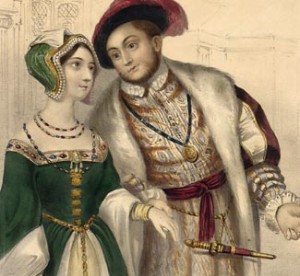 Tudor chronicler Edward Hall recorded in his chronicle:
Tudor chronicler Edward Hall recorded in his chronicle:
“The kyng, after his returne [from Calais] maried priuily[privily] the lady Anne Bulleyn on sainet Erkenwaldes daie, whiche mariage was kept so secrete, that very fewe knewe it, til she was greate with child, at Easter after.”1
He is saying that Henry VIII and Anne Boleyn were secretly married on St Erkenwald’s Day on their return from their trip to Calais. St Erkenwald’s Day is the 14th November so Hall believed that the couple married on 14th November 1532, two months before their official, but still quite secret, marriage on 25th January 1533.
Hall is not the only person to give this date for the marriage. Nicholas Sander, author of “The Rise of the English Schism” and a Catholic recusant writing in Elizabeth’s reign, appears to back it up:
“The king, now impatient of further delay, though everything had not yet been duly prepared, determined to marry Anne Boleyn secretly on the 14th of the following November. He must marry her, for in no other way could he accomplish his will; and the marriage must be secret, because he and Catherine had not been separated by any judicial decision.”2
Sander is not, however, a separate source because he cites Hall as his reference. It is interesting though, as historian Eric Ives points out, that Sander chooses the November date for the wedding when that would make Elizabeth I conceived in wedlock and “he had every reason to slander Elizabeth’s legitimacy”3. Ives believes that the 14th November could well have been the date that Henry VIII and Anne Boleyn “made some sort of formal commitment” because it “does coincide with the approximate start of cohabitation.” We don’t know whether it was their successful trip to meet Francis I at Calais (and I do believe that it was successful) or some kind of betrothal ceremony which gave Henry and Anne the confidence to take their relationship to the next level and risk pregnancy. I believe that there is truth in Hall’s record, there was some kind of secret ceremony.
Also on this day…
Catherine of Aragon married Arthur, Prince of Wales, at St Paul’s Cathedral, which had been decked out with rich tapestries.4
Ten year-old Prince Henry, the future Henry VIII and Catherine’s future second husband, escorted Catherine from the Bishop’s Palace to the cathedral door. The bride wore a Spanish style white satin wedding dress, with a farthingale and “many pleats”, and a while silk veil decorated with gold, pearls and gemstones covered her face. The bridegroom was also in white satin. After the ceremony, the couple enjoyed a sumptuous banquet, while Londoners enjoyed a fountain of running wine. The heir to the throne had a young and vivacious wife, there was hope and happiness.
Notes and Sources
- Hall’s Chronicle, Edward Hall, p794
- Rise and Growth of the Anglican Schism, Nicholas Sander, p92-93
- The Life and Death of Anne Boleyn, Eric Ives, p170
- Catherine of Aragon: Henry’s Spanish Queen, Giles Tremlett,Chapter 10 “Wedding”